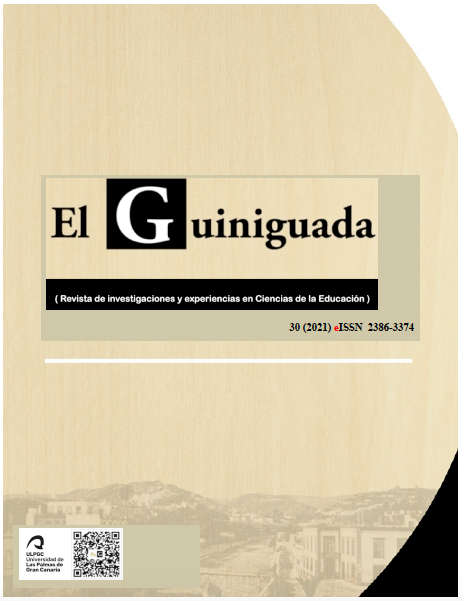Dialogic Literary Gatherings: social and personal transformations
doi.org/10.20420/ElGuiniguada.2021.401
Keywords:
literary freedom, dialogic gatherings, dialogic interactions, power interactionsAbstract
Since their creation in 1978 at the La Verneda-Sant Martí Adult School, located in one of the most disadvantaged and marginalized neighborhoods of Barcelona at the time, Dialogical Literary Gatherings (DLG) have generated social transformations in diverse contexts, in different countries, with people from different socioeconomic and educational levels and of different ages. Since then they have challenged racist and classist theories of structuralist and poststructuralist schools of thought that deny people from low SES backgrounds the possibility of reading and enjoying the best literary works of humanity. However, DLG defend and promote the literary freedom of all people, thus managing to overcome power interactions and carry out profound social and personal transformations.
Downloads
References
Álvarez, P., García-Carrión, R., Puigvert, L., Pulido, C., & Schubert, T. (2018). Beyond the Walls: The Social Reintegration of Prisoners Through the Dialogic Reading of Classic Universal Literature in Prison. International Journal of Offender Therapy and Comparative Criminology, 62(4), 1043–1061. https://doi.org/10.1177/0306624X16672864
Aubert, A. (2015). Amaya: Dialogic Literary Gatherings Evoking Passion for Learning and a Transformation of the Relationships of a Roma Girl With Her Classmates. Qualitative Inquiry, 21(10), 858–864. https://doi.org/10.1177/1077800415614034
Bayard, P. (2013). Cómo hablar de los libros que no se han leído. Anagrama.
de Botton, L., Girbés, S., Ruiz, L., & Tellado, I. (2014). Moroccan mothers’ involvement in dialogic literary gatherings in a Catalan urban primary school: Increasing educative interactions and improving learning. Improving schools, 17(3), 241-240. https://doi.org/10.1177/1365480214556420
Elboj, C. (2015). Clara, From the Ghetto to the European Parliament. Qualitative Inquiry, 21(10), 879–885. https://doi.org/10.1177/1077800415611695
Flecha, A. (2015). Isabel, From Adult Learner to Community Activist. Qualitative Inquiry, 21(10), 865–871. https://doi.org/10.1177/1077800415611693
Flecha, R. (1999). Modern and postmodern racism in Europe: Dialogic approach and anti-racist pedagogies. Harvard Educational Review 69(2), 150–71. https://meridian.allenpress.com/her/article-abstract/69/2/150/31706/Modern-and-Postmodern-Racism-in-Europe-Dialogic?redirectedFrom=fulltext
Flecha, R. (ed.) (2015). Successful educational actions for inclusion and social cohesion in Europe. Springer.
Flecha, R., & Soler, M. (2013). Turning difficulties into possibilities: Engaging Roma families and students in school through dialogic learning. Cambridge Journal of Education, 43(4), 451–465. https://doi.org/10.1080/0305764X.2013.819068
Garcia-Carrion, R., Molina Roldán, S., & Roca Campos, E. (2018). Interactive Learning Environments for the Educational Improvement of Students with Disabilities in Special Schools. Frontiers in Psychology, 9, 1744. https://doi.org/10.3389/fpsyg.2018.01744
García-Carrión, R., Villardón-Gallego, L., Martínez-de-la-Hidalga, Z., & Marauri, J. (2020). Exploring the Impact of Dialogic Literary Gatherings on Students’ Relationships With a Communicative Approach. Qualitative Inquiry, 26(8-9), 996-1002. https://doi.org/10.1177/1077800420938879
García-Yeste, C., Gairal, R., & Ríos, O. (2017a). Empoderamiento e Inclusión Social de Mujeres Inmigrantes a través de las Tertulias Literarias Dialógicas. Revista Internacional de Educación para la Justicia Social (RIEJS), 6(2), 97-111. https://doi.org/10.15366/riejs2017.6.2.006
Garcia Yeste, C., Gairal Casado, R., Munté Pascual, A., & Plaja Viñas, T. (2017b). Dialogic literary gatherings and out-of-home child care: Creation of new meanings through classic literature. Child & Family Social Work, 23, 62-70. https://doi.org/10.1111/cfs.12384
Habermas, J. (1984). The Theory of Communicative Action. V1. Reason and the
Rationalization of Society. Beacon Press.
Hernández Quintana, B. (2016). Don Quijote en las aulas del siglo XXI. El
Guiniguada. Revista de investigaciones y experiencias en Ciencias de la
Educación, 25, 17-21. doi: 10.20420/ElGuiniguada.2016.0082
INCLUD-ED (2006-2011). Strategies for Inclusion and Social Cohesion in Europe from Education. 6th Framework Programme. Citizens and Governance in a KnowledgeBased Society. CIT4-CT-2006-028603. Directorate-General for Research, European Commission. https://cordis.europa.eu/project/id/28603/es
Munté, A. (2015). The Naked Wind Turns/the Corner in Surprise: A Transformative Narrative About Roma Inclusion. Qualitative Inquiry, 21(10), 893–898. https://doi.org/10.1177/1077800415614033
Plaza, J. M. (2005). El peligro del Quijote temprano. Idea La Mancha : revista de educación de Castilla-La Mancha, 1(1), 107-114. http://hdl.handle.net/11162/20213
Porto, H. J. (2015). Andrés Trapiello: «Yo no pondría nunca el “Quijote” en la escuela, sí les hablaría muchísimo a los niños de todo lo que representa». Retrieved May 10, 2021, from La Voz de Galicia website: https://www.lavozdegalicia.es/noticia/cultura/2015/06/02/pondria-nunca-quijote-escuela-hablaria-muchisimo-ninos-representa/00031433280218543702121.htm
Puigvert, L. (2012). The dialogic turn: Dialogue or violence? International and Multidisciplinary Journal of Social Science, 1(1), 78–96. http://dx.doi.org/10.4471/rimcis.2012.04
Racionero-Plaza, S. (2015). Reconstructing Autobiographical Memories and Crafting a New Self Through Dialogic Literary Gatherings. Qualitative Inquiry, 21(10), 920–926. https://doi.org/10.1177/1077800415611689
Serradell, O. (2015). Aisha, From Being Invisible to Becoming a Promoter of Social Change. Qualitative Inquiry, 21(10), 906–912. https://doi.org/10.1177/1077800415614030
Soler, M. (2015). Biographies of “Invisible” People Who Transform Their Lives and Enhance Social Transformations Through Dialogic Gatherings. Qualitative Inquiry, 21(10), 839–842. https://doi.org/10.1177/1077800415614032
Soler-Gallart, M. (2017). Achieving Social Impact: Sociology in the Public Sphere.
Springer.
Soler, M., & Flecha, R. (2010). Desde los actos de habla de Austin a los actos
comunicativos. Perspectivas desde Searle, Habermas y CREA. Revista Signos, 43(2), 363-375. http://dx.doi.org/10.4067/S0718-09342010000400007
Teodor, A., & Sordé, T. (2011). How to turn difficulties into opportunities: drawing from diversity to promote social cohesion. International Studies in Sociology of Education, 21(1), 49-62. https://doi.org/10.1080/09620214.2011.543852
The Lehrman Institute. (n.d.). Notable Visitors: Harriet Beecher Stowe (1811-1896). Retrieved May 10, 2021, from Mr. Lincoln’s White House website: http://www.mrlincolnswhitehouse.org/residents-visitors/notable-visitors/notable-visitors-harriet-beecher-stowe-1811-1896/
Wright, E. O. (2010). Envisioning Real Utopias. Verso.
Vygotsky, L. S. (1978). Mind in society : the development of higher psychological processes. Harvard University Press.
Published
How to Cite
Issue
Section
License
Authors who publish with this journal agree to the following terms:
- Authors retain copyright and grant the journal right of first publication with the work simultaneously licensed under a Creative Commons Attribution License that allows others to share the work with an acknowledgement of the work's authorship and initial publication in this journal. You can not make a commercial use of the work. The use derived from the work is also not allowed.
- Authors are able to enter into separate, additional contractual arrangements for the non-exclusive distribution of the journal's published version of the work (e.g., post it to an institutional repository or publish it in a book), with an acknowledgement of its initial publication in this journal.
- Authors are permitted and encouraged to post their work online (e.g., in institutional repositories or on their website) prior to and during the submission process, as it can lead to productive exchanges, as well as earlier and greater citation of published work (See The Effect of Open Access).

















